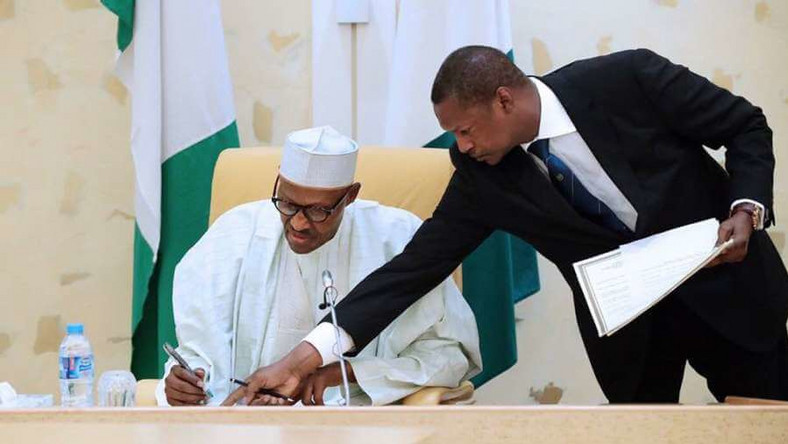Thus, when an ‘outsider, ’Abubakar Malami, was named to the office in 2015, it took less than 10 months in office before darts started coming his way. Not minding his legal experience as a Senior Advocate of Nigeria (SAN), he was peddled as incompetent and a mistake President Muhammadu Buhari needed to correct. Nearly four years in office, and haven confirmed his right to the office, his traducers are not giving up. They seemed to be saying: If he has survived the first term, he must not come back for second term!
That is certainly the impression one gets reading an article published in the Premium Times of April 24, 2019. The writer, Godwin Onyeacholem of the African Centre for Media & Information Literacy (AFRICMIL), chose a headline that laid bare the motive of all the Malami bashing we’ve seen in recent times.
The article entitled “Why Malami Must Not Return As AGF/Justice Minister” continued the well-worn path of condemnation of Malami’s actions based on, as usual, their psychic powers to read his mind and scoop the motives for those actions.
The writer started by making a curious claim that “discerning minds” (Perhaps, disappointed minds) knew that Malami was the death knell to the country’s justice system as soon as the president made him AGF! He stated: “With that appointment, it was clear to the discerning that not only would the reactionary side of the justice sector be prolonged and reinforced, but also that the fight against corruption, the flagship of this administration’s campaign portfolio, would end up as a fluke.”
And the writer offered us no insight to his conclusions beyond stating sanctimoniously that “Malami lacks the vision, radical temperament, professional discipline and the sense of urgency that the Buhari administration requires to birth a sorely needed new dawn completely devoid of the tragic showings of past governments,” whatever that means.
He also described as a “telling irony” that Malami, who’s expected to prosecute criminals and corrupt persons, now “cut deals” with them. And the evidence, according to him, is that nearly four years into the life of the Buhari administration, “the office of the Attorney General of the Federation and Minister of Justice is yet to secure a single conviction for corruption.”
Not only is this claim untrue but shows how facts can easily be disregarded to achieve a premeditated objective. As far back as June 6, 2017, Acting Chairman of the Economic and Financial Crimes Commission, EFCC, said the commission had secured 340 convictions for various offences and recovered billions of dollars of stolen funds from unscrupulous individuals within the last six months of the Buhari administration. And this was just between January 2017 to June 2017!
Only a few days ago, Nigeria’s Nobel Laureate, Wole Soyinka, put a lie to claims by detractors of the Buhari administration that the government had failed to deliver on anti-corruption. Soyinka, who has never been known to be cozy with Buhari, declared that his administration had scored a “pass mark” in his estimation. There is no better testimonial for Buhari and Malami than the comments attributed to Soyinka on anti-corruption.
In a previous article I had argued that if Buhari was Mr. Integrity, then Malami could be rightly considered as Mr. Anti-Corruption. No one can deny that the conception and execution of the anti-corruption strategies of the Buhari administration must necessarily come from Malami’s table. For the first time in the history of the country, a Presidential Advisory Council on Anti-Corruption was inaugurated.
If Malami was truly aversed to the fight against corruption as the writer wants us to believe, why would he initiate and support such a revolutionary anti-corruption council led by one of the fieriest anti-corruption lawyers in the country? Not only as the prof. Itse Sagay’s council intervened publicly at critical times, but it has acted as the think tank of the government on the fight against corruption such that no one characterizes the Buhari administration’s anti-corruption effort as arbitrary.
By assessing Malami’s success as AGF by the number of thieves or corrupt persons jailed, the writer and others of his ilk would rather have a minister of justice would care less about the rule of law. If not they ought to know that convictions is the job of the court, not the attorney general’s office.
Magu himself as said several times in response to critics that success of EFCC depended largely on the court because the commission does not have control over the activities of the court. The responsibility of the EFCC and that of any anti-graft agency is to investigate and charge suspects to court, and it is left for the court to determine their fate.
The writer also inadvertently displayed his ignorance of legal and judicial processes by accusing Malami of cutting deals with crooks instead of jailing them. If this is an honest opinion of the writer, then I must say I’m sorry for his frustration. The very reason of his frustration with Malami, ironically, is because the AGF also decided to positively address his own frustrations with our judicial system by settling some cases out of court where such options are best for the country.
What is the point in insisting on litigations when it may go on for years and you continue to lose critical revenue? Is it not more pragmatic to get some treasury looters willingly return a substantial part of their loot to escape prosecution than engage in an endless and costly court battle? Malami is a realist and pragmatist, and has brought to his office those attributes, which to my mind, as served the country well.
The Sambo Dasuki case is a good example. Many opposition politicians benefitted from the largesse from his office. But those who agreed to return the money they got from him were allowed to walk free, while Dasuki himself is facing prosecution. Those who refused to return what they received are still being prosecuted since 2016, at a time Nigeria needs all the money it can get.
The writer also described the directive to the EFCC to hand over files of high-profile cases in its possession to the office of the AGF as “pernicious” and an attempt to “bear down” and intimidate the EFCC acting Chairman. He also revealed other official communications between the AGF and the anti-graft commission which exposed the writer as speaking out for someone or some group.
Even though the EFCC is directly under the presidency, it derives its prosecutorial powers from the office of the AGF, which therefore brings it directly under the supervision of the AGF. And what is wrong if the AGF asks for case files? Why do some critics like to input none-existent motives to well-meaning actions of public officials? Such statements are borne not out of normal skepticism about official actions, but out of the dangerous mindset that government is always up to no good.
While I agree with the writer that whistle blowers must be protected, I disagree with his assumption that the AGF is doing nothing about it. Perhaps, the writer wants to see the AGF walk around government offices with horse whip in hand to ensure agencies comply with the Freedom of Information Act. Truth is, the AGF is part of the government which he’s been asked to discipline. But that role gives him four eyes. But we only have two.
Buhari has a tough choice to make to constitute his next cabinet. One of those choices is whether to retain Malami as AGF or not. If Buhari follows his heart, he would be fiercely criticized by those who believed Malami never deserved the office. But he is the President!
























Leave a comment